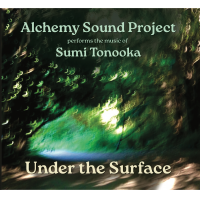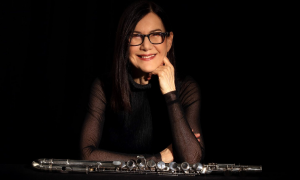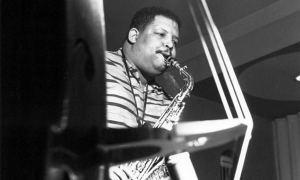Home » Jazz Articles » Interview » Alex Clarke: She Does It Her Way
Alex Clarke: She Does It Her Way

Courtesy Anne Bennison
College sucked the fun out of music for me. I wasní»t into all the modal stuff we were being taught, but when I said so, I was told, oh, at this stage you doní»t know what youí»re into. And I was sat there thinking, no, actually I do know exactly what Ií»m into. Ií»m into the straightahead, changes based, melodic tradition. I want to be part of that sound world, and push it forward, too.
—Alex Clarke
The three judges were class of 2015 tenor star

Nubya Garcia
saxophone
Orphy Robinson
vibraphoneb.1960

Guy Barker
arrangerb.1957
Among the aspects of Clarke's set which so impressed the judges was her sound, which, on both alto and tenor, is just gorgeous. It struck a particular chord with Garcia, who possesses a wonderfully resonant, burnished tone herself. Still only twenty years old as we enter 2021, Clarke's sound is already something special. And like a good wine, it will get even better. She also stands out from the crowd because of her stylistic trajectory. Clarke is not enamoured of modal jazz, the preferred ballpark for most musicians on the young British scene, and she is not afraid to say so. She is into the melody-led tradition which began in New Orleans a century ago, was developed by swing era saxophonists such as

Ben Webster
saxophone, tenor1909 - 1973

Lester Young
saxophone1909 - 1959

Stan Getz
saxophone, tenor1927 - 1991

Sonny Rollins
saxophoneb.1930
Clarke's refreshingly off-trend approach is, of course, mainly a product of an independent mindset. It may also have something to do with growing up outside London, which is very much the centre of Britain's post-2015 alternative jazz scene. Clarke was born in Macclesfield in South Cheshire in the north of the country and grew up down the road in Congleton. She now lives fifty miles south of there, near Birmingham, to where she moved in 2019 to begin a jazz degree at Birmingham Conservatoire. Disenchanted with how she was being taught, Clarke left after the first year.
Clarke self-released her debut album, Mirage, in summer 2018. It was more than promising, with assured performances of two originals and versions of material by

Tubby Hayes
saxophone, tenor1935 - 1973

Cole Porter
composer / conductor1891 - 1964

Antonio Carlos Jobim
piano1927 - 1994
In this interview, Clarke discusses her journey so far, and concludes with talking about six albums which are particularly important to her.
All About Jazz: Do you come from a musical family?
Alex Clarke: Not particularly. We had a piano in the house because mum's gran had been a pianist. So I'd sit down at it and noodle around and try and figure things out by ear. My dad is totally unmusical and tone deaf.
AAJ: How did you arrive at the saxophone?
AC: I'd always said I wanted to play sax. I guess I thought it looked like a cool instrument. But mum said it was too noisy and we lived in a semi-detached house and she thought it would disturb the neighbours. So I learnt the flute. But after a few years I still had this burning desire to play sax. The pivotal moment came when I went away on a school wind-band weekend and I heard a sax playing in the room next door and it sounded so wonderful. As soon as I got back home I said, "Mum, I still really want to play the saxophone." And she relented and I got an alto.
AAJ: Can you remember the moment when you fell in love with jazz?
AC: Yes. I was eleven and I was playing flute in the wind band at school. It was my first termly concert and the school big band finished off the evening. Their performance was the highlight for me. At that point I only played music off the page and it was really exciting to hear my older schoolmates improvising and playing this music that seemed so full of life. That's when it started for me. After I had expressed an interest in jazz, my dad started going to charity shops and picking up secondhand CDs for me. The first one he got was a Glenn Miller compilation. If we went shopping and he left me in the car I would play "In The Mood" on repeat, endlessly. Dad didn't really know what he was buying and I didn't really know what I was listening to, and the CDs he got were pretty random. But when I came across a track I particularly liked I'd look the artist up on YouTube and discover a load more things. That's how I broadened my listening and discovered people like Ben Webster and

Charlie Parker
saxophone, alto1920 - 1955

Louis Armstrong
trumpet and vocals1901 - 1971
AAJ: Your love of standards shines through your BBC performance. So does the sound you get on both alto and tenor. It sounds unforced, though I'm sure it hasn't been that easy.
AC: Actually, you're right, my sound is pretty natural. I've never sat down and said, today I'm going to work on my sound. It's always been a by-product of my other practice. And I never followed my teachers' instructions when they said you should do long tones to develop your sound and spend ages playing into a metronome and practicing vibrato. All those things I should have done, I've never done. But I've listened to so many players that I know what I want to sound like. That said, I worked on improving my embrochure in 2020 with the help of
Dean Masser
saxophoneAAJ: You're in good company there. In an interview in January 2020,

Pharoah Sanders
saxophone, tenor1940 - 2022
AC: I guess it's something that keeps on developing all your life.
AAJ: You've been quoted as saying you had inspirational music teachers at school, but in 2019 you left Birmingham Conservatoire after completing only the first year of a three or four year degree. Why was that?
AC: I think being at college can go two ways. For some people, it is super inspiring. For me, it killed all motivation. There were only eight or nine hours of contact teaching each week and all the rest of time you were meant to practice—and when I wasn't practicing I was feeling guilty about it. It just totally sucked the fun out of music, it felt like I was forcing myself to play while previously it had been such joy. By the third term I actually didn't get my sax out of the case at all apart from at my end of year exam. And basically, I didn't see eye to eye with the faculty. I wasn't into all the modal and experimental stuff we were being taught, but whenever I said so, I was told, oh, at this stage you don't know what you're into. And I was sat there thinking, no, actually I do know exactly what I'm into. I'm into the straight-ahead, changes based, melodic tradition. On alto, I want to sound like
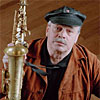
Phil Woods
saxophone, alto1931 - 2015

Duke Ellington
piano1899 - 1974
AAJ: It sounds like the college approach was pretty much one size fits all.
AC: Anything pre-bebop was skimmed over. We had a couple of lessons on Miles, a few on Trane, but only one lesson on the whole of New Orleans music. Another thing was that my fellow students seemed to lack any interest in learning standards. The focus of my practice has always been learning standards and transcribing. But everyone at college was all about writing new music. You'd go to a jam session and there'd only be a really small repertoire that everyone had in common. So they'd keep calling the same ten tunes. Whereas I know loads of Great American Songbook stuff, and you can do what you want with them. You can rearrange them so they're more modern or you can play them as they are. But nobody wanted to play straight-ahead and bebop. There was always this desire to push the genre and be modern and progressive. Which is OK but it is only part of the picture. I think it comes from young people wanting to look cool and sound fresh and young. And we were fresh and young. But it doesn't mean you just dismiss the tradition.
AAJ: With the BBC Young Jazz Musician competition you were able to do what you wanted for a change.
AC: It came along at a really good time. I'd not long left the conservatoire and it gave me something to focus on during the pandemic, when playing gigs, which is what it's all about for me, was off the agenda. I submitted my first round, which was two videos, early in 2020 and each next round was a kind of marker point, something to practice for. Not wanting to make a fool of myself on national television gave me an incentive to practice. It gave my diary a bit of structure.
AAJ: Your first album was made in 2018. Coming up for three years later, with the BBC finals under your belt, you must be thinking about the next one.
AC: I don't have a definite plan yet but I'm thinking about it a lot. I have some arrangements for a quartet recording of standards that I was going to do before lockdown happened. I'd still like to do that at some point. But I'm also thinking it might be nice to do some sort of quintet album, either with another tenor player or a trumpeter, something that swings and has something about it. I think two tenors can work really nicely. I'm really into the

Ronnie Scott
saxophone, tenor1927 - 1996
AAJ: Whatever you choose, we'll be looking forward to it.
ALEX CLARKE: SIX ALL-TIME FAVOURITE ALBUMS
 The Jazz Couriers Featuring Ronnie Scott And Tubby Hayes
The Jazz Couriers Featuring Ronnie Scott And Tubby Hayes In Concert
Tempo, 1958
This was recorded at the Dominion Theatre in London's West End. There's something about hearing that live atmosphere captured. The sound isn't quite perfect, you can hear the audience in the background, but there's something really exciting about it all. The improvisations are astounding, and the tempos they are playing at, like on "What Is This Thing Called Love," are so up they're amazing. Yet the band is so precise and it still really swings. You can hear the energy in it. I love it. Ronnie Scott first met Tubby Hayes when Tubby was about fifteen years old and asked if he could sit in. "He scared the life out of me," said Ronnie. They made a great team.
 The Phil Woods Six
The Phil Woods SixLive From The Showboat
RCA Victor, 1977
I've picked this for similar reasons as the Ronnie and Tubby album, the whole live vibe and the risk taking that comes from playing live. You can really hear that here. And Phil's sound. I think for me that live is when I'm most in love with his sound. You can hear the projection and the intention behind what he plays. And of course it really, really swings. The rhythm section as well—particularly

Bill Goodwin
drumsb.1942
 Cory Weeds & The Jeff Hamilton Trio
Cory Weeds & The Jeff Hamilton TrioThis Happy Madness
Cellar Live, 2015
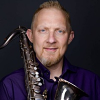
Cory Weeds
saxophone, altob.1973

Jeff Hamilton
drumsb.1953
 Scott Hamilton / Harry Allen
Scott Hamilton / Harry Allen Live!
GAC, 2016
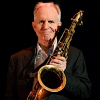
Scott Hamilton
saxophone, tenorb.1954

Harry Allen
saxophoneb.1966

Rossano Sportiello
pianob.1974
 Michel Camilo
Michel Camilo One More Once
Columbia, 1994
Latin jazz is something I got into through Paquito D'Rivera, who is playing alto on this album. Some of his stuff could be bookmarked as a bit cheesy, but you cannot deny that he is an absolutely phenomenal player. His technique, particularly in the altissimo range, is something I'd love to attain one day. The whole album is a wonderful mix of tunes and you've got the Latin percussion. And harmonically it's very accessible, like a lot of Latin stuff. In a way it's what I listen to instead of listening to modal jazz. I don't listen to a lot of modal—bars and bars and bars of a D minor vamp does not do it for me. But in a Latin context, with all the percussion going on, I really love that sort of thing.
 The Ken Peplowski Big Band
The Ken Peplowski Big Band Sunrise
Arbors, 2018
I came to the clarinet after the saxophone and the flute, so it is always playing catch up. And it's always required when I'm playing New Orleans tunes and I constantly feel inadequate on it and constantly want to get out a soprano instead. But listening to people like

Ken Peplowski
woodwindsb.1959

John Allred
tromboneTags
Comments
PREVIOUS / NEXT
Support All About Jazz
 All About Jazz has been a pillar of jazz since 1995, championing it as an art form and, more importantly, supporting the musicians who make it. Our enduring commitment has made "AAJ" one of the most culturally important websites of its kind, read by hundreds of thousands of fans, musicians and industry figures every month.
All About Jazz has been a pillar of jazz since 1995, championing it as an art form and, more importantly, supporting the musicians who make it. Our enduring commitment has made "AAJ" one of the most culturally important websites of its kind, read by hundreds of thousands of fans, musicians and industry figures every month.








 Buy Now
Buy Now


